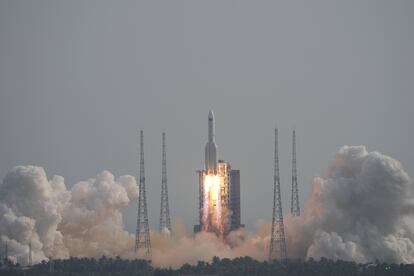US military: out-of-control Chinese rocket booster breaks up over South Pacific
Authorities allowed a Long March-5B Y4 core stage to detach in a chaotic manner, triggering fears of dangerous falling debris hitting land

China once again triggered a global alarm after allowing part of a rocket from its ambitious space program to fall back to Earth in an uncontrolled manner. The Long March-5B Y4, which delivered the last module to China’s Tiangong space station, weighs in excess of 20 tons, although friction against the atmosphere tends to disintegrate much of this space debris on its way back to Earth.
This is the third time in two years that Chinese space authorities have generated this global danger, which NASA has described on several occasions as irresponsible. The chaotic orbit in which China disposed of the module made it very difficult to calculate when and where it would fall specifically, although air and space authorities had predicted a path that included parts of the US, Central and South America, southern Europe, Africa, southeast Asia and Australia. On Friday, the US military reported that the module had broken up over the South Pacific.
#USSPACECOM can confirm the People’s Republic of China Long March 5B #CZ5B rocket re-entered the atmosphere over the south-central Pacific Ocean at 4:01am MDT/10:01 UTC on 11/4. For details on the uncontrolled reentry’s impact location, we once again refer you to the #PRC.
— U.S. Space Command (@US_SpaceCom) November 4, 2022
In Spain, authorities shut down airspace over of the airports of Barcelona, Tarragona, Ibiza and Reus for about 40 minutes on Friday morning. The EU Space Surveillance and Tracking agency predicted the module would pass over the Iberian Peninsula twice, making it a possible point of impact.
The Chinese space program deliberately lets one stage of its Long March rockets fall uncontrollably to Earth every time they are used. The last time China caused this planetary scare was on July 30, when much of this space junk disintegrated over the Indian Ocean. In May 2021, rocket debris again fell into the Indian Ocean, near India and Sri Lanka. NASA responded with a highly critical statement: “It is clear that China is not meeting responsible standards regarding its space debris.” In March of this year, a chunk of space debris also hit the Moon: it turned out to be the remains of another Chinese rocket that was left adrift.
Tu suscripción se está usando en otro dispositivo
¿Quieres añadir otro usuario a tu suscripción?
Si continúas leyendo en este dispositivo, no se podrá leer en el otro.
FlechaTu suscripción se está usando en otro dispositivo y solo puedes acceder a EL PAÍS desde un dispositivo a la vez.
Si quieres compartir tu cuenta, cambia tu suscripción a la modalidad Premium, así podrás añadir otro usuario. Cada uno accederá con su propia cuenta de email, lo que os permitirá personalizar vuestra experiencia en EL PAÍS.
¿Tienes una suscripción de empresa? Accede aquí para contratar más cuentas.
En el caso de no saber quién está usando tu cuenta, te recomendamos cambiar tu contraseña aquí.
Si decides continuar compartiendo tu cuenta, este mensaje se mostrará en tu dispositivo y en el de la otra persona que está usando tu cuenta de forma indefinida, afectando a tu experiencia de lectura. Puedes consultar aquí los términos y condiciones de la suscripción digital.








































